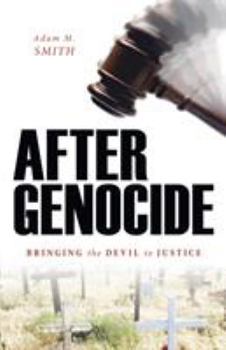After Genocide: Bringing the Devil to Justice
This comprehensive examination of the complex, politicized world of international criminal justice reviews the serious shortcomings of a system that rarely accomplishes its goal of bringing mass murderers to justice. The author, an international lawyer who has worked at The Hague and in the Balkans and is the son of a Holocaust refugee, focuses on several hot spots, including: - The former Yugoslavia, where a one-billion-dollar investment has spectacularly backfired.- Sierra Leone, where the same wartime factions that the international community tried to dismantle remain, and in some quarters are stronger than ever.- Rwanda, where the post-conflict tribunal was met with dismay by all sectors of society and receives begrudging cooperation from the Rwandan government.- Sudan and Uganda, where the nascent International Criminal Court has inexplicably replicated many of the same problems that plague the former Yugoslavia, Sierra Leone, and Rwanda.Are other options available to provide the good of justice without the potentially devastating side effects? Smith illustrates the viability of a counterintuitive "solution" to dealing with genocide and other mass crimes: to entrust the challenging, potentially destabilizing work of war-crimes justice to the very states affected by the crimes. This well-researched and forcefully argued book is indispensable reading for voters, policymakers, and citizens as well as lawyers, academics, and human rights activists who hope that "never again" can be more than a platitude.
Format:Hardcover
Language:English
ISBN:1591026849
ISBN13:9781591026846
Release Date:January 2009
Publisher:Prometheus Books
Length:441 Pages
Weight:0.95 lbs.
Dimensions:1.2" x 6.0" x 9.3"
Customer Reviews
2 ratings
A Brilliant Expose on what is wrong with International Justice and how to fix it
Published by Thriftbooks.com User , 15 years ago
Genocide is one of the most reprehensible crimes that man can commit against man. Adam Smith takes a look at how the world has responded to prosecuting these criminals; using international law. He pays close attention to how the trials have worked for the former Yugoslavia, Rwanda, and Sierra Leone. While he claims they might have done some good, often they do more harm; often at the expense of local justice. International law, and how to prosecute people under international law, has been fraught with pitfalls and political maneuvering, and Adam Smith covers this politically charged topic with skill. The author uses many examples to show how international courts do not always bring justice and peace to conflict zones. Mr. Smith critically points out the cost and the time to prosecute these criminals; a masterful approach to convince people that international courts might not be the way to prosecute these crimes. At times he seems long-winded, but it does not distract from the overall quality. A must read for anyone who wants to know about international law and how it has been applied over the years. R eviewed by Kevin Winter
The problems of an inept international justice system
Published by Thriftbooks.com User , 15 years ago
AFTER GENOCIDE tells of the post-Cold War attempt to bring justice to those victimized by atrocious crimes - an attempt which degenerated into a system that increased suffering, instead. Adam M. Smith is an international lawyer who worked in the Balkans and is the son of a Holocaust refugee: his survey examines politics, international interacts, and the problems of an inept international justice system around the world. A fine addition to any college-level library strong in legal and international relations.





